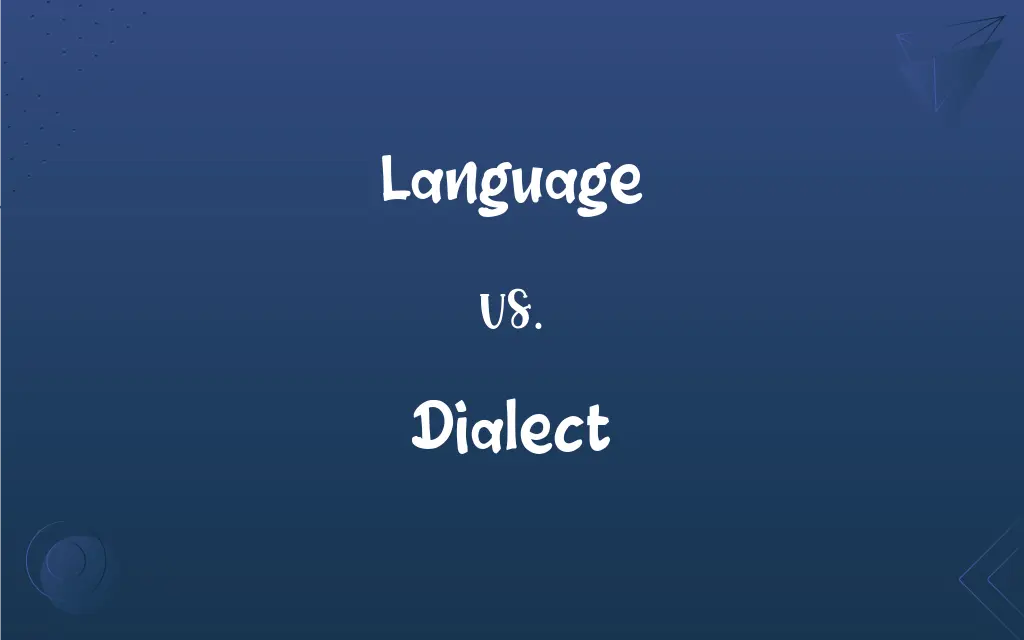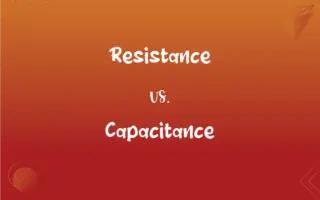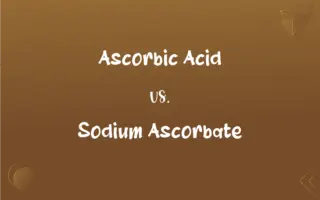Language vs. Dialect: What's the Difference?
Edited by Aimie Carlson || By Harlon Moss || Published on December 24, 2023
Language is a system of communication with its own vocabulary and grammar; a dialect is a regional or social variation of a language, often with distinct pronunciation, grammar, and vocabulary.

Key Differences
Language is a comprehensive system of communication, comprising a structured set of symbols, sounds, and grammar rules. Dialects are subsets of a language, reflecting specific regional or social groups, and may include unique lexical choices, pronunciations, and grammatical structures. While languages often have standardized forms, dialects can exhibit more fluidity and variation within the same language.
A language typically has a recognized status and may be used in government, education, and media. Dialects, however, are often seen as less prestigious variations of a language, used in more informal or local settings. While languages are often taught in schools, dialects are usually acquired naturally in a community or familial setting.
Languages can have multiple dialects; for example, English includes dialects like American, British, and Australian English. Each dialect retains the fundamental structure of English but differs in aspects like vocabulary, pronunciation, and sometimes grammar. This variation does not impede mutual intelligibility, a key factor distinguishing dialects from separate languages.
Dialects can sometimes evolve into distinct languages, especially when geographical or social separation leads to significant divergence. In contrast, languages can absorb or influence dialects, leading to dialect leveling or the creation of a standardized language form. The relationship between language and dialect is dynamic and can change over time.
Comparison Chart
Definition
A structured system of communication with its own vocabulary and grammar
A variation of a language, reflecting regional or social differences
ADVERTISEMENT
Usage Context
Used in formal settings like education and media
Often used informally within specific communities or regions
Standardization
Usually has a standardized form
Lacks standardization, more fluid and varied
Mutual Intelligibility
Typically mutually intelligible across its speakers
Usually mutually intelligible with other dialects of the same language
Evolution
Can evolve and influence dialects
Can evolve into a distinct language over time
Language and Dialect Definitions
Language
Language is a system of symbols and rules for effective communication.
English is a language spoken worldwide.
ADVERTISEMENT
Dialect
Dialects reflect the linguistic habits of specific groups.
Rural dialects often preserve older linguistic features.
Language
Language can refer to the specific speech or writing of a particular group.
The legal language is complex and specific.
Dialect
Dialects include variations in pronunciation, vocabulary, and grammar.
Cockney is a well-known dialect of English in London.
Language
Language serves as a medium for expressing ideas and emotions.
Poetry uses the beauty of language to convey feelings.
Dialect
A dialect is a subset of a language spoken by a particular community.
The dialect in that village has unique idiomatic expressions.
Language
A language is a method of human communication using spoken or written words.
Learning a new language can be challenging.
Dialect
A dialect is a regional or social variation of a language.
The southern dialect has a distinctive drawl.
Language
Language is a tool for cultural and social interaction.
Language bridges gaps between different cultures.
Dialect
Dialects can signify a person's regional or social identity.
Her dialect immediately revealed her Midwestern roots.
Dialect
A regional or social variety of a language distinguished by pronunciation, grammar, or vocabulary, especially a variety of speech differing from the standard literary language or speech pattern of the culture in which it exists
Cockney is a dialect of English.
FAQs
What defines a language?
A set of structured communication rules and symbols used by a community.
Can dialects be understood by all speakers of a language?
Generally, yes, though some dialects may have unique elements.
Do languages influence dialects?
Yes, dialects evolve within the framework of a language.
Can a dialect become a language?
Yes, over time and with significant evolution.
Do dialects change over time?
Yes, they evolve with the community's linguistic practices.
Are dialects less important than languages?
No, they are equally important in cultural and linguistic contexts.
Are dialects taught in schools?
Typically, formal education focuses on the standard language form.
What is a dialect?
A regional or social variation of a language with unique characteristics.
How do new dialects form?
Through geographical, social, and cultural separation and evolution.
Are dialects a barrier to communication?
Not usually, though they can pose challenges in mutual understanding.
Is the grammar of a dialect different from its language?
It can have variations, but generally follows the language's grammar.
Are languages universally standardized?
Most have standard forms, especially in formal contexts.
Can one language have multiple dialects?
Yes, often reflecting different regions or social groups.
Can people be bilingual in two dialects?
Yes, especially if they belong to different socio-cultural groups.
Can a language exist without dialects?
Theoretically, yes, but practically, most languages have dialect variations.
Is accent a part of dialect?
Yes, accent is a key component of dialect.
Is a creole a language or a dialect?
A creole is considered a distinct language, often evolved from a pidgin.
Do dialects affect language learning?
They can influence the accent and usage patterns of language learners.
Can two dialects of the same language be very different?
Yes, especially in cases of significant geographical or cultural separation.
Do dialects have their own literature?
Sometimes, especially in regions where the dialect is strongly preserved.
About Author
Written by
Harlon MossHarlon is a seasoned quality moderator and accomplished content writer for Difference Wiki. An alumnus of the prestigious University of California, he earned his degree in Computer Science. Leveraging his academic background, Harlon brings a meticulous and informed perspective to his work, ensuring content accuracy and excellence.
Edited by
Aimie CarlsonAimie Carlson, holding a master's degree in English literature, is a fervent English language enthusiast. She lends her writing talents to Difference Wiki, a prominent website that specializes in comparisons, offering readers insightful analyses that both captivate and inform.































































